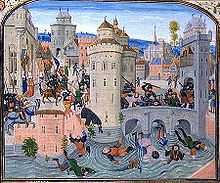“killed a knight, put him on a spit, and roasted him with his wife and children looking on. After ten or twelve of them raped the lady, they wished to force feed them the roasted flesh of their father and husband and made them then die by a miserable death.”
Why was this particular peasant uprising so savage? It's not really possible to give a definitive explanation for something like that, but it is possible to make an educated guess. The Jacquerie began when groups of peasants gathered to discuss a new law that required them to defend the castles of the French nobility who were off campaigning against the English.
This law took the peasants away from their fields and directly impacted their ability to grow the crops they needed to survive. It also came on the heels of numerous incidents in which the French nobility had disgraced and humiliated itself on the battlefield, sometimes abandoning the peasant infantry to be ridden down and slaughtered by the English. In addition, the nobles had completely failed to protect the peasants from wandering bands of mercenaries who often raided villages and committed murders, rapes and other crimes. When the peasants got together to discuss the defense of the castles against the English, someone angrily pointed out that the nobles had never defended them, and that it would be better to murder all of the nobles and rid the world of their entire class, rather than to suffer for the sake of the nobility.
And so the Jacquerie began, characterized more by huge mobs of angry peasants over-running castles and slaughtering the inhabitants rather than by any kind of strategy. The Jacquerie was ultimately suppressed, and then followed by mass murders against the peasants by the nobility in reprisal. The aristocratic victims of the Jacquerie numbered in the hundreds, while the peasant victims of the reprisal campaign numbered in the tens of thousands. The story of the Jacquerie is a cautionary tale of the consequences of any revolution based on sheer rage rather than on a call for justice.
